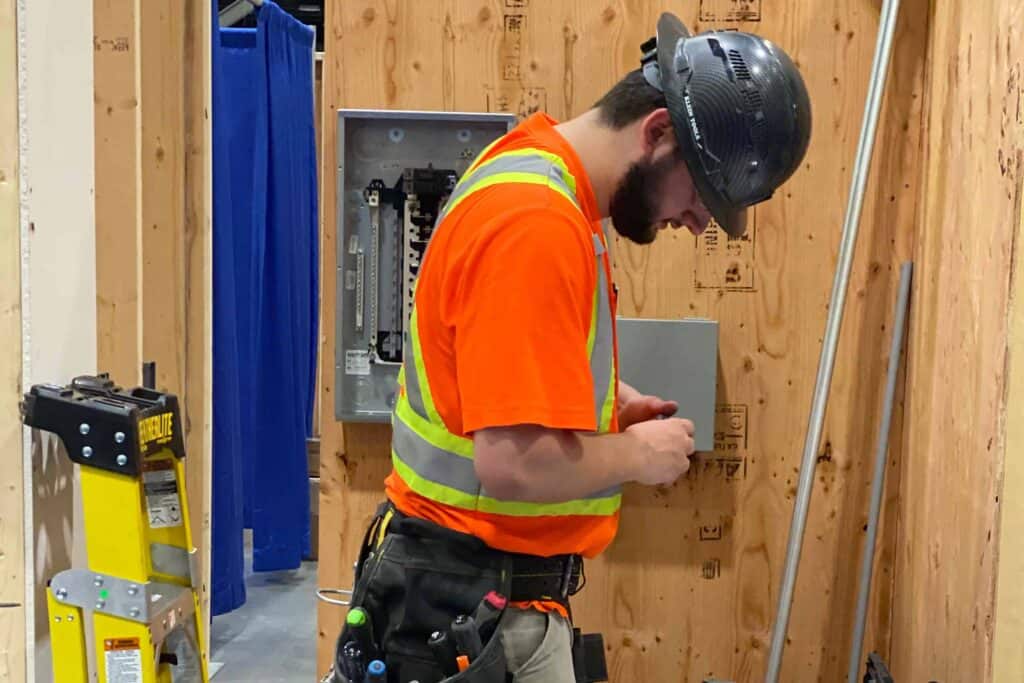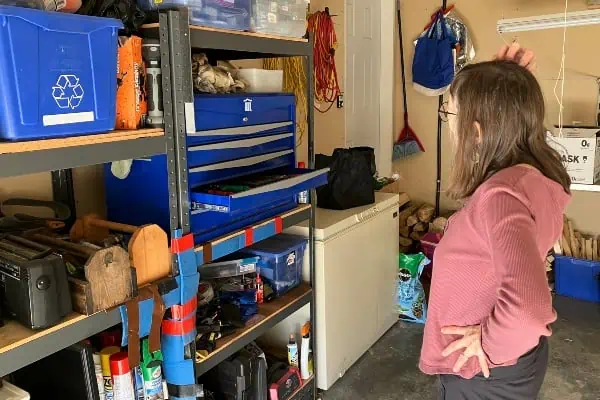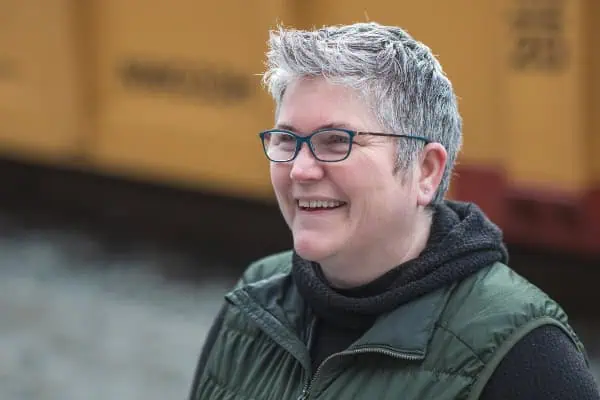

Connor Robert Kaszycki
2022 Nationals Gold Medalist and National Alumni Committee member
Age: 25
Trade & Certifications: Red Seal Construction Electrician
Current workplace: Evergreen Homes and Construction
How did you decide on your trade?
I’ve always enjoyed working with my hands, whether it’s something as small as Lego or as large as a building, putting things together has always been a hobby of mine. At first I wasn’t too aware of the trades, growing up, thinking my fate was tied to a university of sorts. But once I got involved with electrical and began training to become a journeyman, I’ve been in love ever since. Electrical is a lot of puzzle and problem solving, both of which I’ve always enjoyed doing, as a child, and still love to do today, so it was almost a perfect fit for me.
What were the first steps you took in the trade?
I started in the pre-apprenticeship course at the college, straight out of high school and almost no trades experience to my name. As you can imagine, I took a couple zaps when I first started putting things together, so it certainly was not easy to get the hang of it quickly. It showed me that I would have to challenge myself and adapt to an environment that I originally struggled in. Took some time, but with a lot of effort, a lot of time and some help from classmates, teachers, co-workers, and some extra determination, I was able to blossom into what I am today.
Is there anything you do to help motivate others to join the trade?
I recently helped organize and teach a workshop for the Yukon Women in Trades and Technology (YWITT) program, and I’ve shown a number of high-school girls how to wire up and tie in some electrical equipment. I’m not sure if I was the best teacher in the world, as it was my first time doing any sort of teaching in my life, but I think the girls enjoyed it and it was nice to see their eyes light up when they were able to get the light to turn on! I would love to do more volunteering like that, as it was a lot of fun and evenI was able to learn a little from the experience!
Was there anything you found intimidating about your job before you started? If so, how did you overcome that?
The most-intimidating part of my job is that it pushed me out of my comfort zone. When I first started the trades, I wasn’t exactly confident in what I was doing. I’d second guess myself a lot, trying to make sure what I did was correct, and often I would overthink situations while not asking enough questions about the work I was doing. It was a mix of both self-depreciation—thinking that I should know things and that I wasn’t good enough—and a lack of confidence in the work I was doing. It showed me that I was being complacent with where I was in life and that I was afraid of stepping outside of what I had found comfortable over the years. It was challenging, for sure, and there were times where I didn’t think I was cut out for this kind of work, being who I was at the time. However, something just clicked eventually. I started to get better, I started to find my voice with the trade and I started to push myself to not only stop overthinking but to start being proud and confident in what I was doing.
What is the best part of being in your trade?
I’d have to say the satisfaction and the amazement at the end. You get a set of prints with a design of a house, a building or a set of controls on it and sometimes they have specs of where they want things installed, and other times you have to design it yourself using the code book as a reference. It’s always satisfying and exciting making it all work, wiring it all up, turning it on and watching the devices come to life with power. And knowing that you’re the one who made it all work is probably the best feeling that you can ever experience within the trades, and it always calls for a kind of celebration!
If you met someone who was looking at getting a job in your trade, what piece of advice would you give them?
Best advice I can give is to never stop learning and always be willing to learn. In some ways electricity is finite, but in a whole lot of others, there’s a million ways to get things to work. One person might do things differently from everyone else and still make everything work, and there’s an endless amount of different work that you can do with electricity. The more experience you can get and the more that you learn while on the job, the better off you’re going to be, and you’ll always keep learning every day. Be open to learning something new, as in this trade you’ll be learning every day, even after you have graduated from school.
What is the most-interesting thing/project you have worked on?
The water treatment plant in Dawson City, for sure. There was so much to that job, a whole giant [Programmable Logic Controller] PLC cabinet for all of the plant functions, a bunch of different pumps and motors that you had to run the proper power and controls to, a sanitation room, a workshop and even an office space and laboratory upstairs. There was so much to learn that I not only got to experience, while working on it, but that I got to see for myself once it was finished. That job in itself was what taught me the most and made me fall even more in love with the trade!
Is there something about your trade that you think not many people know?
It is a common misconception that most tradespeople are all a bunch of strong guys who just throw things together and who don’t have to think much in order to make everything work. That stereotype of tradespeople cannot be further from the truth in all trades, but even more so in electrical. There’s a lot that you have to be constantly thinking about in order to make your work not only work but also look good and pass inspections. Trigonometry, scientific electrical theory and a lot of rules and regulations go into a large amount of the work that you do as an electrician. Trust me, when you stop thinking and just go into autopilot mode to get things done, that’s when all the mistakes happen, and it’s never fun to have to go back and troubleshoot everything.
How long did it take you to reach the certification you have now, and do you have plans for further education?
It took me around five to six years to fully complete the electrical journeyman program in the Yukon. There are four different two- to three-month courses, while you have to accredit a certain amount of workplace experience between each set of classes. You also get the opportunity to take some workplace-related courses in order to get tickets to do specific jobs (such as first aid, hazardous materials, fall protection, etc.). I do plan on going back to school, in the future, for possibly electrical engineering and designing, but for the time being, I just plan on continuing to work hard.
Were you eligible for any grants or incentives for doing an apprenticeship in the Yukon?
The two big ones are the Apprenticeship Incentive Grant, which grants a taxable amount of 1,000 dollars a year, per level, for two years; and the Apprenticeship Completion Grant, which is a one-time taxable grant of 2,000 dollars for completing your apprenticeship.
Where do you see your career in five to 10 years?
I think once I work in the trade for a while longer, I will most likely return to school for an electrical engineering degree and continue to learn more and more about electricity, as a whole, while designing and developing large-scale projects all across Canada. It will take a lot of time and effort, but I wholeheartedly believe that it will be possible, as long as I keep working hard!




